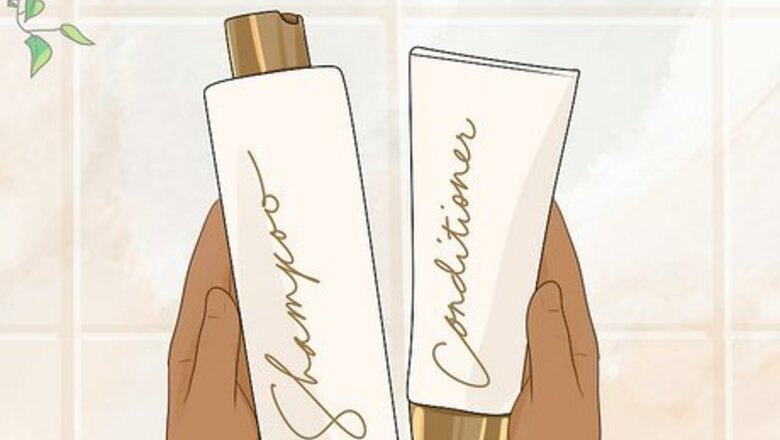
views
- Shampoo, condition, detangle, and straighten your natural hair with a brush and blow dryer to prepare it for braiding.
- Braid synthetic or human hair extensions into your own sectioned natural hair, adjusting the thickness of the sections according to how thick you want the box braids.
- Dip your completed braids in boiling water to seal them, cover them with a silk scarf to protect them at night, and wash and oil them once every 3 weeks.
- Style your box braids as you would any loose-hanging hair, in updos or with hair trinkets, then remove the box braids after 8 weeks to avoid damaging your natural hair.
Prepping Your Natural Hair
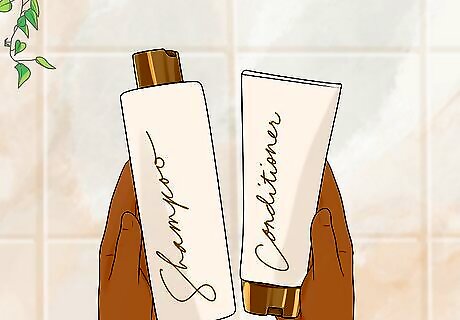
Shampoo and condition your hair. Start by washing your hair with a clarifying shampoo, which will remove any dirt or debris from your hair. Then, use a deep conditioner to add moisture back into your hair, which will strengthen your hair and make it easier to work with. Use a leave-in conditioner if your hair tends to be very dry or frizzy. Shampoo and condition your hair even if you are going to use hair extensions for the braids—this will ensure the hair extensions attach properly to your natural hair.
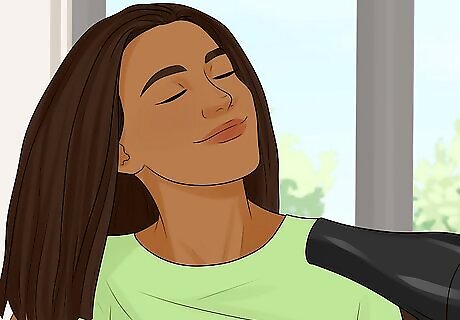
Detangle and dry your hair with a hair dryer. Use a plastic wide-tooth comb to gently remove any tangles or knots. Then, apply a heat protectant gel or spray to your hair, and run a brush down the length of the underside. Follow it closely with a blow dryer on medium-low heat, until your hair lays dry and roughly straight. This will make parting your hair for the braids easier, especially if you have very curly hair. If your blow dryer comes with a comb or pick attachment, you can use that. Alternatively, flat iron dry hair with a hair straightener if you’d prefer. Make sure you apply heat protectant before you straighten your hair.
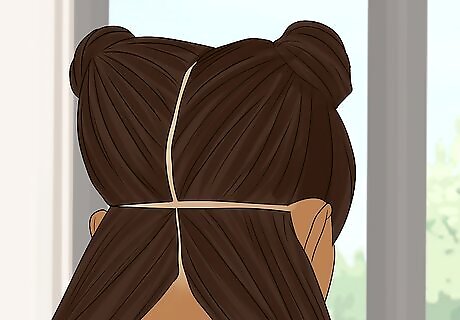
Divide your hair into 4 box-shaped sections with a wide-tooth comb. Create 4 sections by dividing your hair down the center from your forehead to your neck, then from ear to ear. Leave the first section you plan to work on undone. Make sure the sections are evenly parted, with a clear straight line at the roots, forming a box shape. Use 3 large hair clips to keep the remaining 3 sections out of the way. Make sure your hair is evenly divided between each section. You may need to do the parts in front of a mirror to get a better sense of their shape. Dividing your hair into 4 large sections first will keep unworked parts of your hair out of the way as you braid.
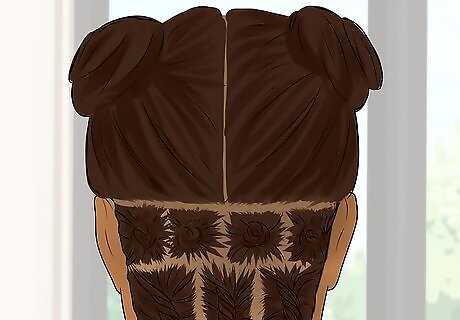
Part your hair into a 1 in (2.5 cm) section with a rat tail comb. Take the pointed end of the rat-tail comb and run it through one of the front parts you made earlier in your hair. Section out a .5 in (1.3 cm) square section of hair above your ear if you are doing small to medium-sized braids. If you are creating jumbo box braids, section out 2 inches (5.1 cm) of hair. Make sure the part above the section of hair is straight. Use the toothed end of the comb to brush away any flyaways so the part is neat and clean. Tie back the rest of the hair in the section so it is out of the way.
Braiding in Hair Extensions
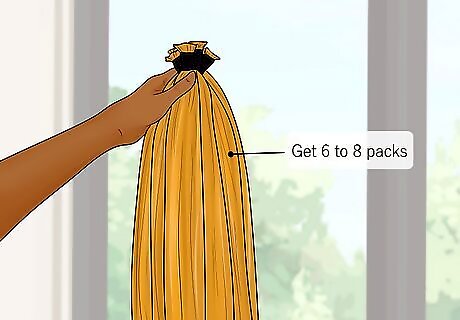
Purchase 6-8 packs of synthetic hair for long, thick braids. Shorter, thinner box braids may require fewer packs of hair. Look for synthetic hair (which is less prone to frizz) that is smooth and soft at your local beauty supply store or online. Soft-pressed Kanekalon Expression hair and pre-stretched Kanekalon hair are the most common types of synthetic hair used for box braids. You could also use human hair extensions or yarn hair. When in doubt, get more hair than you think you might need. Use any leftover hair for another style later or return it, if the retailer allows returns.
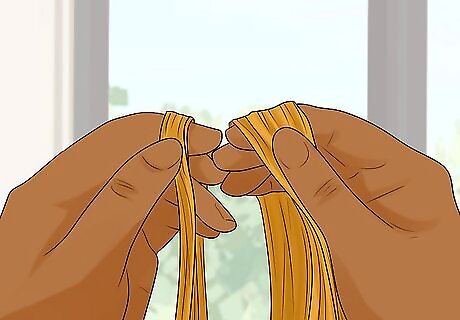
Gather 1.5–2 inches (3.8–5.1 cm) of sectioned hair, and separate ⅓ of it. Take a section on synthetic hair that’s just a bit thicker than your sectioned natural hair. Then, remove about a third of the synthetic hair, so that you’re holding 2 strands—one thick and one thin. Alternatively, separate the full synthetic extension into 3 equally sized strands, then join 2 of them to create the thick and thin sections.
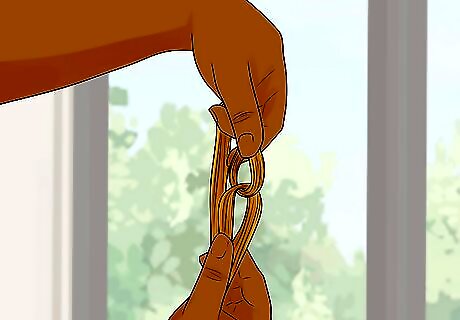
Loop the thin strand around the center of the thick strand. Cross the 2 sections of hair at their centers, and fold the thin strand back on itself. This leaves you with 3 strands of hair that are about equal thicknesses, since the thin strand has been doubled up to form a single, thicker strand. Hold the extension by the base of the loop with your thumb and forefinger to keep it secured.
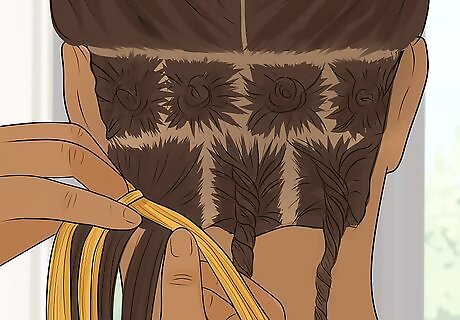
Position the synthetic hair over your natural hair at the roots. While retaining 3 separate strands of synthetic hair, choose a strand to serve as your center or anchor strand, which you’ll combine with your natural hair. Align the loop of the sectioned hair immediately over the roots of your natural hair section, pinching your anchor strand together with your natural hair.
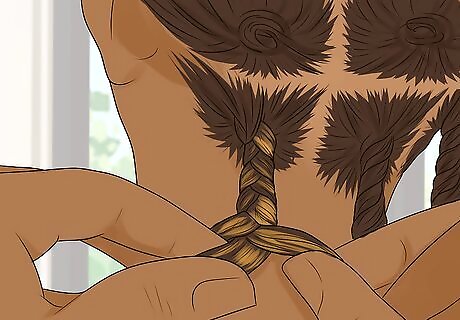
Braid your natural and synthetic hair together, and finish with an elastic. Holding the anchor strand of synthetic hair and your natural hair strand together, begin braiding the synthetic hair. Pull the right-hand strand under the anchor strand so that the right-hand strand is now positioned in the center. Then, pull the left-hand strand under the center strand (what was just the right-hand strand) so that it’s now in the center. Repeat this process all the way down the length of hair, then secure the ends with a hair elastic. If the braid appears to stay put without an elastic, then tying it off isn’t necessary. Keep the hair taut for a tight, neat braid—but not taut enough to be uncomfortable! Keep even, firm pressure as you braid so the braid appears uniform and smooth.
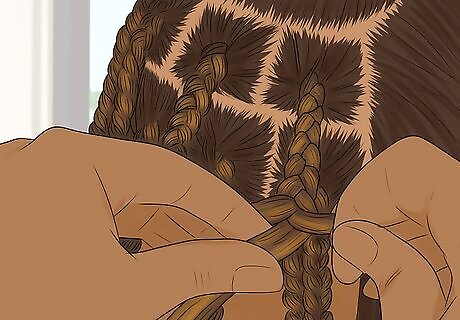
Braid each section one at a time, taking breaks as needed. Work section by section, from the bottom of your scalp to the crown of your head, for easiest handling. It may take several hours to do your entire head in box braids, so take breaks between each section, or as needed. Make sure you create each braid quickly and evenly, as braiding your hair too slowly can cause frizziness. Apply the same amount of pressure so the braids all have the same thickness and shape.
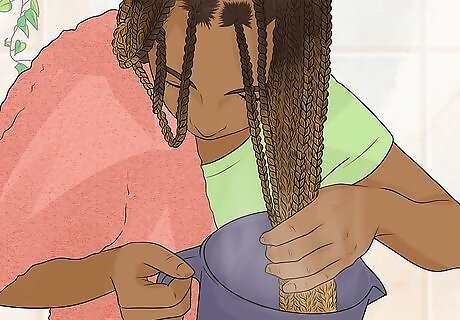
Trim off flyaways and dip the ends of the braids in hot water to seal them. Snip stray hairs as close to the braids as possible so the braids appear smooth, being careful not to snip any of your natural hair. Then, pour boiling water into a bowl and dip each braid from the midsection to the ends in the water for a few seconds. This will help to remove any remaining flyaways and frizziness on the braids, and seal the braids, preventing them from unraveling. If you prefer, remove the elastics after sealing the braids with boiling water.
Caring for and Styling Box Braids
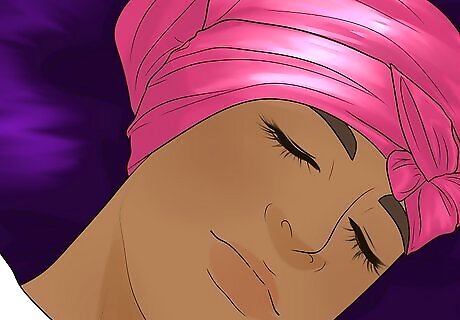
Cover your braids with a silk or satin scarf at night to prevent frizziness. Tie the scarf around your braids at the scalp. If your braids are longer than the scarf itself, you can loosely pin the braids up before wrapping the scarf, effectively shortening them while you sleep, or leave the ends exposed. Alternatively, sleep on a satin or silk pillow cover to keep your braid smooth and frizz free.
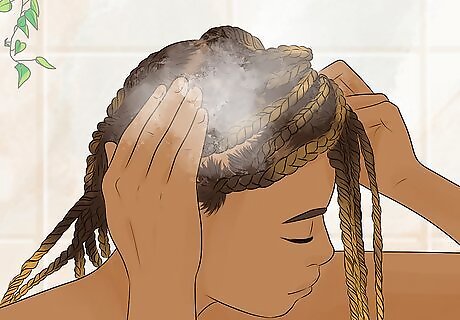
Wash the braids with shampoo warm water, then massage in natural oils. Use a 1:1 mixture of your typical shampoo and warm water, and gently work the mixture from your scalp down to the ends of the braids. Then, use coconut oil in your hair, or apply almond oil or shea butter to protective styles like box braids—with your fingers or a cotton pad, rub a generous dab of oil over your scalp and down the braids. Wash and oil your braids every 3 weeks to keep them clean without causing damage. Alternatively, use a braid spray to keep your braids moisturized throughout the week.
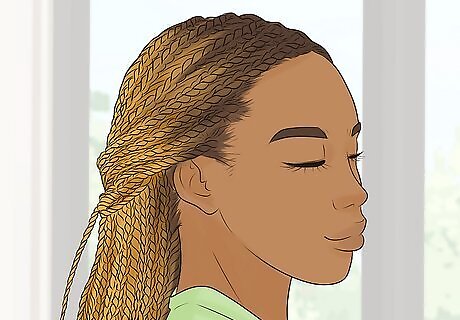
Style your braids in an effortless pull-back or pony. For a pull-back, take 2 braids from just behind each of your ears, and pull them back and around the rest of your braids. Loosely tie the 2 braids to secure the rest. For a pony, use a thick hair tie or scrunchie to tie your braids up, just like you would with any loose-hanging hair. EXPERT TIP Ndeye Anta Niang Ndeye Anta Niang Hair Stylist & Master Braider Ndeye Anta Niang is a Hair Stylist, Master Braider, and Founder of AntaBraids, a traveling braiding service based in New York City. Ndeye has over 20 years of experience in African hair including braiding box braids, Senegalese twists, crochet braids, faux dread locs, goddess locs, kinky twists, and lakhass braids. Ndeye was the first female of her tribe in Africa to move to America and is now sharing her knowledge of African braids passed on from generation to generation. Ndeye Anta Niang Ndeye Anta Niang Hair Stylist & Master Braider Part hair down the middle, wrap top half into a base bun, then coil braids around it for a polished look. For a polished bun with box braids, first part your hair down the middle from ear to ear. Then wrap the top half into a round base at the back of your head. Next, coil the rest of the braids neatly around that base, using a scrunchie if you want extra hold. This gives a nice full bun shape that works for many occasions.
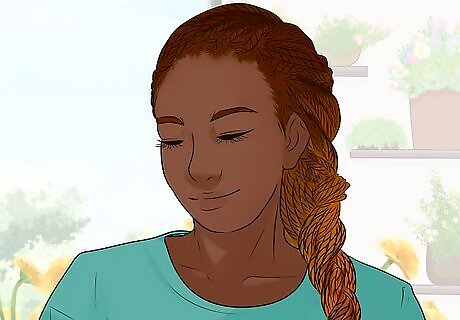
Braid your box braids again for added texture. If you’re looking to add even more mesmerizing patterns to your hair, braid the box braids into French braids. Gather several box braids on one side of your scalp, divide them into three groups, and braid them as though they were loose hair. Then, repeat on the other side of your scalp for twin pigtail braids. Experiment with different braiding styles, using more or fewer box braids on different sections of your scalp for a variety of new looks.
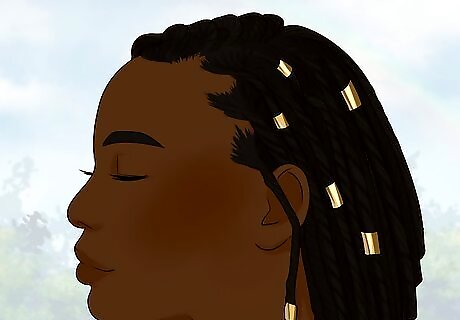
Attach beads or loc clips, or braid in puka shells. Thread hair beads onto your new box braids, or add loc clips to add an eye-catching shimmer. You can also clip in puka shell ornaments for a more beachy look.
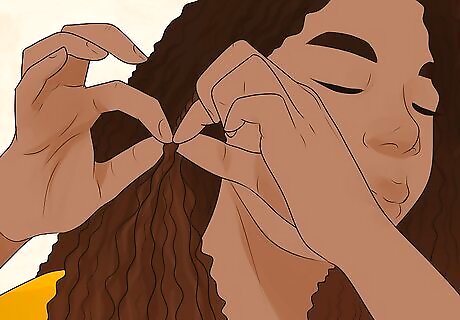
Take the braids out after 8 weeks to prevent hair damage. Box braids usually last for 6-8 weeks, but even if they still look great past that point, take them out so your hair stays strong and healthy. Keeping your hair braided for too long can cause it to break away from the scalp, leading to long-term damage to your hairline and your scalp. Use your fingers to gently unravel the braids from the spot where the synthetic hair attaches to your real hair. Avoid using a fine-tooth comb when taking your braids down, as this can lead to rips and tears in your hair. Throw away the extensions once you have removed them. Wait 3-4 weeks to allow your hair to recover before you install new box braids.













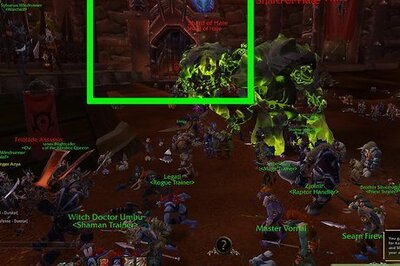





Comments
0 comment